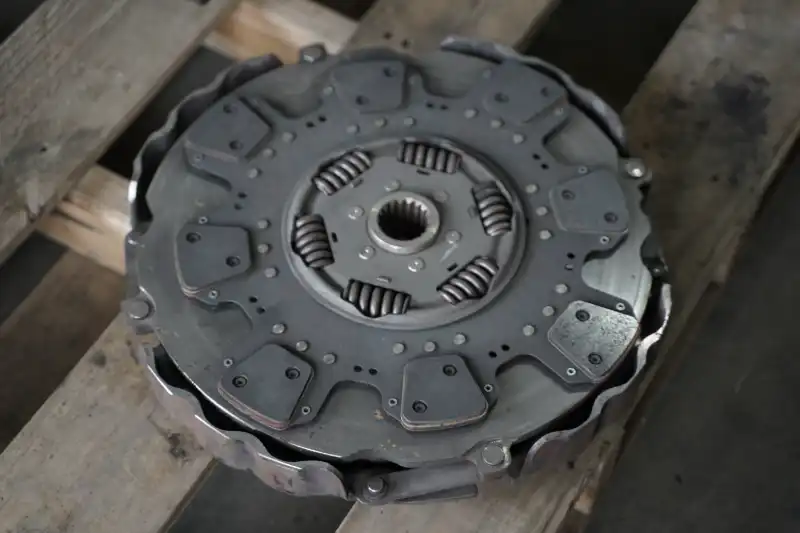
Solving Your Paccar MX-13 Engine’s Faulty Sensor and ECM Malfunctions
Date
author
reading time
Paccar engines are designed for the long-haul. They’re what you want if you need reliability, durability and fuel efficiency. And if you’re running a Paccar MX-13 engine under your hood, chances are you demand a lot from your engine. These engines are the workhorses of many fleets across Atlanta and the Southeastern United States, offering reliable torque and smooth power delivery. But like any high-tech diesel platform, the MX-13 has its quirks. For all its reliability, the MX-13 isn’t immune to sensor problems and ECM (Engine Control Module) glitches. And these two issues can leave even the most seasoned driver scratching their head.
Let’s break down why the Paccar MX-13 is a solid engine, where things can go sideways, and how to steer clear of costly downtime.
What Makes the Paccar MX-13 a Reliable Engine?
If you’re looking for an engine that performs, Paccar’s MX-13 is a crack shot. With horsepower ranging from 405 to 510 and torque ratings up to 1,850 lb-ft, these engines are built for long-haul dependability and optimized for fuel efficiency. We love that the MX-13s feature a high-pressure common rail fuel system, a compacted graphite iron block, and advanced aftertreatment technology. Every part of the MX-13 is designed to extend life cycles and minimize emissions.
It’s also quieter than many other engines on the market, which is a nice-to-have feature. The integration with Kenworth and Peterbilt chassis provides a streamlined operator experience. Overall, if you’re keeping up with a preventive maintenance schedule and keeping your engine in good shape, the MX-13 is a dependable workhorse that can clock big miles without breaking a sweat.
What Can Go Wrong? Common MX-13 Sensor & ECM Issues
Now, there’s no shade here for Paccars MX models or PX models either; we love ‘em, but even the best engines aren’t perfect. And when it comes to the MX-13, many of the issues are related to electronic components. Here’s a look at a few:
1. Faulty Sensors
The key feature of modern engines is that they rely on sensors to monitor the components of your truck and relay the information back to the engine control unit (ECU). There are lots of sensors in your engine, like boost pressure, oil temp, NOx, crankshaft position, to name a few, and if one fails, it can throw off the entire engine's system. For example, a single faulty DPF sensor or EGR temperature sensor can kick our engine into limp mode or trigger unnecessary regens.
2. ECM Communication Loss
The ECM is your truck’s brain; it interacts with the sensors and manages and controls how your engine functions. When the ECM loses communication with the sensors or malfunctions, your engine performance suffers. Whether it's power loss, starting issues, or complete shutdowns, it’s not a fun experience. Corroded harnesses, voltage spikes, and software glitches are often the root cause of these problems and can only be determined by professional diagnostics and repair.
3. Ghost Codes & False Readings
Ghost codes typically relate to the emissions and after-treatment systems on your MX-13. And they can be frustrating. Have you ever cleared a code only to have it come back after 50 miles? Intermittent sensor failure is particularly common in older harnesses, where vibrations or temperature fluctuations can cause poor signal integrity. Things that can trigger false readings include high soot levels, incorrect dosing of DEF, faulty wiring, and outdated software.
Steering Clear of ECM and Sensor Problems on the MX-13
Let’s face it, you’re driving down I-85 on the job; the last thing you need is your dash lighting up like the Fourth of July and your MX-13 giving you signs that something is wrong. While we always love a good diagnostic session with your rigs, emergency repairs are never fun. To keep your Paccar rolling smoothly, here's what you need to do to prevent unexpected visits to our shop bays.
1. Preventive Maintenance is your Friend
When you make regular sensor and ECM diagnostics part of your PM routine, you save yourself time, money and headaches. Regular PM helps catch a slow-responding sensor or degraded wiring early, which can save you from a roadside breakdown or a regen cycle from hell.
2. Stay on Top of Your Electrical System
Before hitting the road, check the battery terminals and inspect the connectors for corrosion. Keeping an eye on the electrical systems and componentry will make it easier for you to prevent any issues in the future. Faulty voltage delivery is the enemy of every sensor and control module in your truck. And if something electrical does fail, a word to the wise: avoid cheap electrical parts. They might seem like a bargain, but it’s a problem waiting to happen.
3. Don’t Skip Software Updates
The ECM is your engine’s computer, and the software is constantly being refined. To ensure your system runs smoothly, don’t skimp on updates. Make sure your system has the latest OEM updates. This will be especially important if you’ve experienced idle issues, unexpected regenerations, or failed emission tests.
4. Cleanliness Counts
Believe it or not, dirty components are not great for your truck. After long hours on the road, dust, debris, and soot can clog DPF filters, cover sensors, and cause you headaches. When the sensors are dirty, you receive ECM data that will cause your after-treatment system to flash warning lights. Keep your after-treatment system clean, and don’t ignore check engine lights tied to emissions.
Why a Trusted Diesel Shop is Key—Especially in Atlanta
Keeping your Paccar MX-13 in top shape and solving your ECM and sensor issues isn’t a job for everyone. While DIY diagnostics can be helpful, they can only take you so far. What you need is a diesel technician who knows the ins and outs of Paccar engines and won’t do a hack job by guessing at the right fix.
At Myles Truck Repair, we serve Atlanta and the surrounding areas with advanced diagnostic software, OEM troubleshooting protocols, and hands-on expertise. We’re doing more than just clearing the code; we’re finding the root cause and fixing the problem. Whether it’s a NOx sensor gone bad, an intermittent wiring issue, or a full-on ECM failure, we’ve got the know-how to get you back on the road faster and safer.
When you trust the shop working on your truck, you can bank on attention to detail, quality service and a team that will work hard to keep you moving. Remember, Paccar engines aren’t cookie-cutter. A misdiagnosis can cost thousands in downtime, labor, and unnecessary parts.
Key Takeaways for Your Paccar MX-13
Alright, don’t let the alarm bells ring after reading that Paccar MX-13 engines are prone to sensor issues and malfunctions. The reality is, if you look hard enough and drive long enough, the Paccar MX-13 is a solid engine. Of course, that’s especially true when smart diagnostics and preventive maintenance are in place to support it. However, when sensors and ECMs start malfunctioning, ignoring the problem is a fast track to lost loads and mounting bills.
What to Know Before Your Next Route
Too long, didn’t read. We get it. Here’s the quick version of what you should know before hitting the road with your Paccar MX-13:
- Know the common symptoms of ECM and sensor failure
- Don’t skip diagnostics just because the engine "feels fine."
- Get regular software and electrical checks
- Trust a diesel shop that knows your engine inside and out
As always, if you’re in the Atlanta area with an MX-13 that is acting up, give us a shout.
more articles
Join us on this expedition through the realms of thought-provoking narratives, practical advice, and the latest trends, as we strive to be your go-to source for inspiration and knowledge.
our Truck Repair Shop locations
Come visit us at any of our 2 locations, with shops in Auburn and Fayetteville. We provide extensive service to Atlanta, Marietta, Athens, & more!


